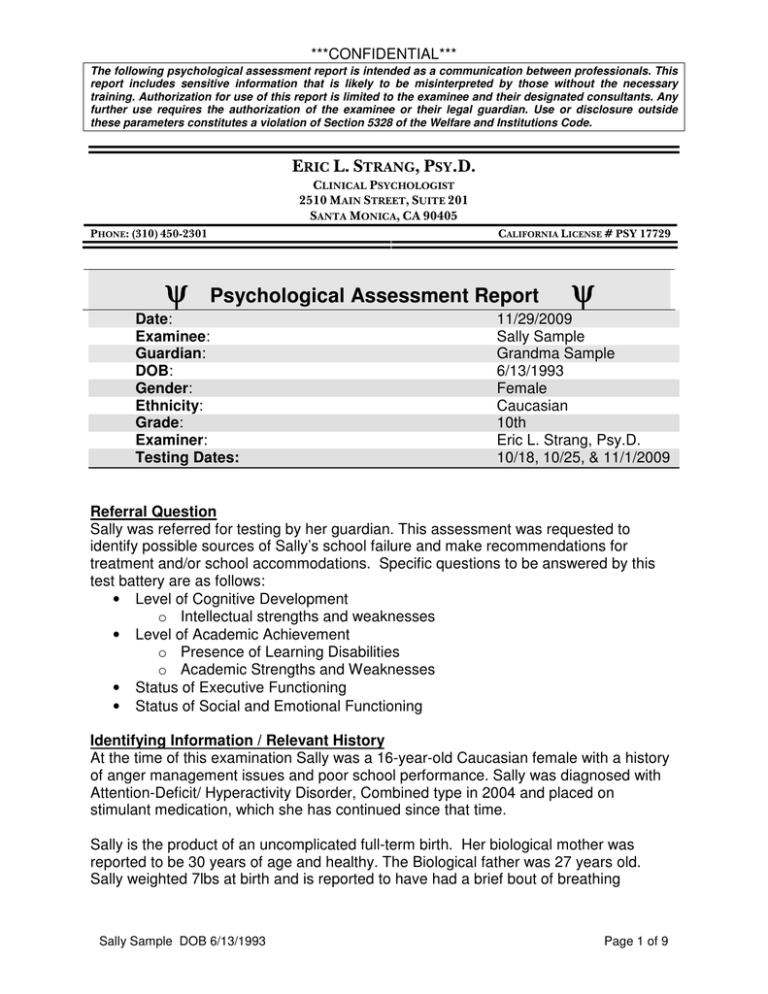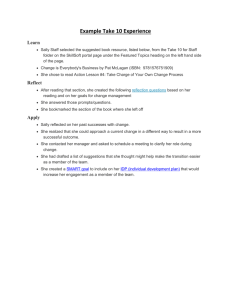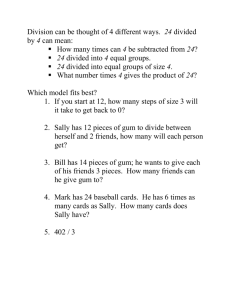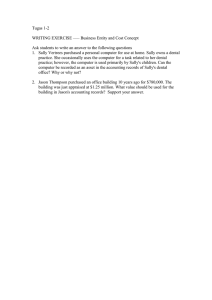ψ Psychological Assessment Report
advertisement

***CONFIDENTIAL*** The following psychological assessment report is intended as a communication between professionals. This report includes sensitive information that is likely to be misinterpreted by those without the necessary training. Authorization for use of this report is limited to the examinee and their designated consultants. Any further use requires the authorization of the examinee or their legal guardian. Use or disclosure outside these parameters constitutes a violation of Section 5328 of the Welfare and Institutions Code. ERIC L. STRANG, PSY.D. CLINICAL PSYCHOLOGIST 2510 MAIN STREET, SUITE 201 SANTA MONICA, CA 90405 PHONE: (310) 450-2301 ψ CALIFORNIA LICENSE # PSY 17729 Psychological Assessment Report Date: Examinee: Guardian: DOB: Gender: Ethnicity: Grade: Examiner: Testing Dates: ψ 11/29/2009 Sally Sample Grandma Sample 6/13/1993 Female Caucasian 10th Eric L. Strang, Psy.D. 10/18, 10/25, & 11/1/2009 Referral Question Sally was referred for testing by her guardian. This assessment was requested to identify possible sources of Sally’s school failure and make recommendations for treatment and/or school accommodations. Specific questions to be answered by this test battery are as follows: • Level of Cognitive Development o Intellectual strengths and weaknesses • Level of Academic Achievement o Presence of Learning Disabilities o Academic Strengths and Weaknesses • Status of Executive Functioning • Status of Social and Emotional Functioning Identifying Information / Relevant History At the time of this examination Sally was a 16-year-old Caucasian female with a history of anger management issues and poor school performance. Sally was diagnosed with Attention-Deficit/ Hyperactivity Disorder, Combined type in 2004 and placed on stimulant medication, which she has continued since that time. Sally is the product of an uncomplicated full-term birth. Her biological mother was reported to be 30 years of age and healthy. The Biological father was 27 years old. Sally weighted 7lbs at birth and is reported to have had a brief bout of breathing Sally Sample DOB 6/13/1993 Page 1 of 9 ***CONFIDENTIAL*** The following psychological assessment report is intended as a communication between professionals. This report includes sensitive information that is likely to be misinterpreted by those without the necessary training. Authorization for use of this report is limited to the examinee and their designated consultants. Any further use requires the authorization of the examinee or their legal guardian. Use or disclosure outside these parameters constitutes a violation of Section 5328 of the Welfare and Institutions Code. difficulty that was resolved without further incident. She is reported to have met all her developmental milestones within the normal time frame and was receiving care at a nursery school by 18 months of age. Significant events in Sally’s life include the following: • Parents separated when Sally was approximately 11 months • Parents officially divorced when She was 2 years old • Sally moved in with her Maternal Grandparents at 2.5 years of age. • Sally began to experience academic problems in 3th grade • Psychoeducational Assessment was conducted at Jon Doe Elementary during 4th grade. o IEP was recommended under Other Health Impairment due to ADHD. o No other deficits identified. • Sally transferred to Lady Jane’s after one semester at Alfred E. Neuman Middle School (5th grade) • Transferred to Jon Doe High for 9th and 10th grades • Experienced school failure during the latter portion of 10th grade. Instruments Sally was administered the following instruments: • Bender-Gestalt-2 (Bender) • Wechsler Intelligence Scale for Children, Fourth Edition (WISC-IV) • Roberts Apperception Test for Children, Second Edition (RATC-2) • Integrated Visual / Auditory Continuous Performance Test (IVA-Plus) • Behavioral Assessment System for Children, Second Edition (BASC-2) • Rorschach Inkblot Test, Exner Comprehensive System (Rorschach) • House, Tree, Person Test (HTP) • Minnesota Multiphasic Personality Inventory for Adolescents (MMPI-A) • Wechsler Individual Achievement Test, Second Edition (WIAT-II) • Rey Complex Figure Test (RCFT) • Behavior Rating Inventory of Executive Functioning (BRIEF) • Sentence Completion (SC) Observations Sally presented for evaluation wearing age appropriate casual clothing. Notable physical characteristics included height and weight in the upper percentiles making her look older than her stated age. Sally’s grooming appeared adequate and She wore her hair short. Her activity level during her evaluation was normal and her speech was clear and unremarkable. No unusual mannerisms were noted and her eye contact was within normal limits. No overt indicators of aggression or impulsivity were noted during the examination. Sally’s mood and affect were observed to be normal and congruent. Likewise, there were no undue signs of anxiety, hostility, or irritability. Sally was cooperative throughout the evaluation and appeared to give her best effort to all of the Sally Sample DOB 6/13/1993 Page 2 of 9 ***CONFIDENTIAL*** The following psychological assessment report is intended as a communication between professionals. This report includes sensitive information that is likely to be misinterpreted by those without the necessary training. Authorization for use of this report is limited to the examinee and their designated consultants. Any further use requires the authorization of the examinee or their legal guardian. Use or disclosure outside these parameters constitutes a violation of Section 5328 of the Welfare and Institutions Code. tasks presented. In fact, Sally demonstrated an admirable level of persistence in solving difficult problems. Finally, her reactions to failure and frustration were normal and appropriately modulated. Results VALIDITY (BENDER , MMPI-A, & RORSCHACH) Sally’s performance on measures of visual-motor coordination indicated that She was not experiencing any serious neurological problems at the time of her examination. Her ability to coordinate her visual perceptions with the movements of her hands was in the average range and appropriate for someone her age. There were no unusual circumstances or disruptions during her testing which might have interfered with Sally giving her best performance. The results of the cognitive and academic sections of this report are held to be a valid measure of Sally’s functioning at the time of her examination. However, it appears that Sally has a tendency to minimize her problems, and in some cases resort to denial, affected the validity of socioemotional measures given. Her self report indicates a possible effort to appear less in need than She actually is. This was especially evident in situations where the questions had obvious intentions to tap feelings of depression and anxiety. Others measures that did not rely on her self-report, or were not obvious in their intent, indicated a higher degree of problems than her self report. Due to the consensus of the information obtained by objective (non-self report) methods, they will make up the bulk of the results presented in these sections. COGNITIVE FUNCTIONING (WISC-IV, RORSCHACH, RCFT, BRIEF, BASC-2, MMPI-A, & IVA-PLUS) Intelligence Sally’s general intellectual functioning was measured to fall within the Average range with her overall thinking and reasoning abilities exceeding those of approximately 30 percent of her same-age peers. Although She performed slightly better on verbal than on nonverbal reasoning tasks, there was no significant difference between Sally's ability to reason with or without the use of words. Sally’s verbal reasoning/concept formation was measured to fall within the Average range and was above that of approximately 45 percent of her peers. Sally performed comparably on the verbal subtests contributing to this overall index, indicating that her verbal cognitive abilities are evenly developed. Sally’s nonverbal/perceptual reasoning abilities were also measured to be in the Average range and above those of approximately 30 percent of her peers. She performed similarly on the perceptual reasoning subtests contributing to this overall measure of nonverbal reasoning, indicating that her visual-spatial reasoning and perceptual-organizational skills are evenly developed. It must be noted that one measure of Sally’s nonverbal reasoning (Block Design) was well below that of the others and was removed from the overall computation by substituting an equivalent Sally Sample DOB 6/13/1993 Page 3 of 9 ***CONFIDENTIAL*** The following psychological assessment report is intended as a communication between professionals. This report includes sensitive information that is likely to be misinterpreted by those without the necessary training. Authorization for use of this report is limited to the examinee and their designated consultants. Any further use requires the authorization of the examinee or their legal guardian. Use or disclosure outside these parameters constitutes a violation of Section 5328 of the Welfare and Institutions Code. measure that was not as dependent on perceptual organization, spatial visualization, or abstract conceptualization. In order to investigate Sally’s difficulties with block design, a multiple-choice version was administered. This was also found to fall well below that of her peers. Her performance suggests that She may have difficulty with visual discrimination and mental construction. This means She is likely to have difficulties distinguishing between subtle differences in the presence of distracting items. Although She performed somewhat better on the multiple-choice task than on the manual construction task, the difference was not significant. It is worth noting that Sally performed much better when performance speed was removed from the equation. This indicates that her ability to process visual-perceptual information consistently is comparable to her peers when She is afforded extra time to complete the task. Sally will likely benefit from being allowed additional time to process visual information. There were also indicators that She is more capable processing visual information when structure is provided. Specifically, when She was given a grid overlay to orient a target design to, She was able to complete designs that She was previously unable to solve. Sally's working memory was found to be in the Average range. Her general ability to hold items in her memory while performing some operation on them was better than approximately 34 percent of her age-mates in this area. It should be noted that this is a time-limited rote memory task that shows capability rather than practical application of working memory. Also noted was a memory pattern that is indicative of problems with rapid encoding. Sally appears better able to remember items She has been exposed to after more time has passed than if She is asked to recall these more immediately. This again points out the need for her to be afforded more time in academic endeavors. Sally's ability to rapidly process visual material without making errors was also measured to be in the Average range when compared to her peers. She performed better than approximately 34 percent of her peers on the processing speed tasks. Sally's performance on a task that had her rapidly scan and recognize visual material was significantly better when the items She was scanning were structured than unstructured. This difference is unusual among people her age, and indicates that Sally may have considerable difficulty structuring her own work without assistance, especially on tasks that require rapid scanning of visual information. This pattern is more common among youth with attention and learning difficulties. Attention / Concentration Sally’s overall ability to regulate her responses and respond appropriately (Inhibition of Impulses) was measured to be seriously impaired and below that of 99 percent of her same age peers. The largest impairment in this area was with regulating her responses to auditory stimuli. Her ability to regulate her responses to visual inputs was also impaired but much less so. Her overall ability to make accurate responses, stay focused, and sustain her attention was found to fall in the average range with her score being above 72 percent of her age-mates. Sally’s ability to reliably respond accurately and quickly under low demand conditions as well as sustain her attention Sally Sample DOB 6/13/1993 Page 4 of 9 ***CONFIDENTIAL*** The following psychological assessment report is intended as a communication between professionals. This report includes sensitive information that is likely to be misinterpreted by those without the necessary training. Authorization for use of this report is limited to the examinee and their designated consultants. Any further use requires the authorization of the examinee or their legal guardian. Use or disclosure outside these parameters constitutes a violation of Section 5328 of the Welfare and Institutions Code. and be flexible under high demand conditions was stronger with auditory input than with visual inputs. Her auditory performance in this area was found to be in the average range and superior to 55 percent of her age-mates. However, Sally’s visual performance in this area was in the mildly impaired range and below that of 88 percent of those her age. Overall, it appears that Sally is best able to attend to visual information when time is not a factor and when She is able to do so in a distraction-free environment. Perceptual Accuracy and Thought Processing Sally’s capacity to accurately perceive the world around her appears to be impaired by her propensity to disregard important information by limiting her awareness, and by her negative mindset. She experiences particular problems with accurate perception of people and relationships. Sally appears to avoid important emotional information in herself and others which makes it hard to assess interpersonal situations accurately. This type of thinking is seen in persons having experienced interpersonal trauma. Sally’s ability to test the reality of her thoughts and ideas is similarly impaired due to her propensity to distort the world around her by attending to only select parts in order to avoid being overwhelmed or becoming aware of feelings of need within herself. Sally does possess the capacity for logical thought but her need to ignore the details and emotional aspects of situations make it difficult for her to come to rational conclusions. Defenses utilized by Sally include detachment, devaluation, and minimization with denial being her primary method of coping. Sally’s ability to integrate information is being limited by her tendency to be hasty and neglectful in taking in information from the world around her. This negatively affects her capacity for sound judgment since She tends to disregard information that is important to most people around her. Sally also lacks a coherent problem solving style, with her approach vacillating between thoughtful reflection and trial-and-error action. Sally appears able to accurately assess her ability and is not prone to overreaching her skills but is rather willing to work with manageable parts of a task. Sally’s level of motivation and willingness to invest mental energy seems to be hampered by her pessimistic outlook and general expectation of negative results. In terms of alertness to her environment, Sally appears to maintain a narrow focus in order to avoid being overwhelmed and/or disappointed. Executive Functioning Sally’s overall capacity to regulate her behavior and organize her efforts toward a selected long-term goal by overriding more immediate desires was found to be significantly impaired. Her performance indicates that her ability to plan and organize is substantially below that of others her age. While it appears that She is able to engage in these functions in more tangible/material circumstances, the addition of interpersonal dynamics such as expectation and evaluation creates serious disruption. Sally Sample DOB 6/13/1993 Page 5 of 9 ***CONFIDENTIAL*** The following psychological assessment report is intended as a communication between professionals. This report includes sensitive information that is likely to be misinterpreted by those without the necessary training. Authorization for use of this report is limited to the examinee and their designated consultants. Any further use requires the authorization of the examinee or their legal guardian. Use or disclosure outside these parameters constitutes a violation of Section 5328 of the Welfare and Institutions Code. Sally’s ability to regulate her emotional responses is likewise impaired and experiences of frustration can overwhelm her efforts to constrain their overt expression. Task initiation appears to be a significant problem for Sally and is likely being exacerbated by her anticipation of negative results from her actions. Sally’s ability to shift from one mode of solution seeking to another also appears to be less developed than most persons her age. Her level of flexibility in problem solving is significantly limited and leads to her engaging in unproductive efforts until She gives up rather than systematically trying different approaches. Sally’s capacity for sustained attention is good long as She is engaged visually and has no distractions. The results indicate a significant level of distractibility especially to sounds. Sally’s ability to delay gratification by controlling her impulses is seriously impaired. She has a great deal of trouble putting off acting on a desire and finds herself off task or involved in activities that are at odds with the environment or goals She has set. Sally appears to have an adequate capacity to persist, which is sometimes unproductive in that She continues to engage in behaviors that produce negative results. When on an effective goal directed path, She effectively sticks with an activity. Sally’s ability to hold items in memory while performing another operation is another area of significant impairment for her. While her rote working memory is as developed as most her persons her age, Sally appears to have problems keeping more complicated information in memory. This might be more of a measure of her impulsivity than of a memory problem in that She knows what to do, but does not do it in the moment something more desirable is present. ACADEMIC FUNCTIONING (WIAT-II) While Sally’s overall achievement in reading was in the High Average range, She demonstrated a variable set of reading skills. She performed much better on tasks that assessed her reading comprehension and capability to correctly apply phonetic decoding rules than on tasks that required her to correctly read aloud a series of printed words. This disparity indicates that annunciating words is an area of relative weakness that is limiting her overall reading skills. Sally’s mathematics skills where measured to be in the Average range. Her skills in this area exceeded that of approximately 45 percent of students her age. Sally’s achievement with standard numerical operations and conceptual applications of mathematical principles were equally matched indicating even development this area. Sally performed in the Average range in overall language skills. Her skills in this area exceeded those of approximately 61 percent of students her age. Sally performed at equivalent levels in the areas of listening comprehension and oral expression indicating that her area of achievement is evenly developed. Sally’s written language skills were somewhat diverse and an overall rating could not be computed. She performed significantly better on tasks that evaluated her ability to correctly spell verbally presented words than on measures of her written expression. While Sally’s skills with Written Expression were within the Average range, they were better than those of only 30 percent of students her age. This is significantly below her Sally Sample DOB 6/13/1993 Page 6 of 9 ***CONFIDENTIAL*** The following psychological assessment report is intended as a communication between professionals. This report includes sensitive information that is likely to be misinterpreted by those without the necessary training. Authorization for use of this report is limited to the examinee and their designated consultants. Any further use requires the authorization of the examinee or their legal guardian. Use or disclosure outside these parameters constitutes a violation of Section 5328 of the Welfare and Institutions Code. achievement in spelling which was above that of approximately 81 percent of her peers, placing her in the High Average range. Sally’s Reading achievement is much higher than anticipated for someone with her general cognitive ability indicating that this is an area of considerable strength for her. There were no indicators of specific learning problems as defined by the DSM-IV. However, it appears that Sally could benefit from assistance with her written expression. SOCIOEMOTIONAL FUNCTIONING (RORSCHACH, MMPI-A, BASC-2, RATC-2, HTP, AND SC) Emotional Functioning Sally’s overall pattern of responding indicates that her emotional functioning is significantly impaired. While her profile provides substantial evidence for the presence of depression, Sally’s self report of depression was negative. Other measures that tapped attitudes and thought processes however, indicated significant amounts of pessimism and negativity in her thought processes. Others who know her also endorsed significant signs and symptoms of depression. These include irritability, low self-esteem, negative and negative outlook. It appears that Sally has been depressed for quite a long time and has little to compare her current emotional state against. Also, as noted above, Sally tends to minimize her needs and likely answered questions about depression in a manner that would make her appear less vulnerable. Sally’s results also indicate that She is currently experiencing manageable levels of anxiety and is no more worried than others her age. While her endorsements indicate that her ability to attend to emotion and emotionality is similar to others her age, She appears to limit this in order to avoid becoming overwhelmed by her own needs or the needs of others. The evidence indicates that Sally expends a great deal of energy holding in her feelings and when under severe stress is prone to explosive displays or acting out. As noted above, Sally’s capacity to control her expression of emotionality is limited, which is a factor that increases the likelihood of explosive emotionality. Self Concept Sally’s self-concept was found to be moderately impaired with evidence that She estimates herself to be inferior to others and inadequate to the demands of life. Her responses indicate that these beliefs are mainly due to her poor school performance rather than a global sense of inferiority. Sally also appears to be significantly confused about her identity and her potential role as an adult. The results also indicate that She attempts to present herself with an somewhat masculine attitude as a way to compensate for her feelings of vulnerability. Sally is currently experiencing a high level of introspection and appears to be ruminating about the past in a negative and painful way. Sally Sample DOB 6/13/1993 Page 7 of 9 ***CONFIDENTIAL*** The following psychological assessment report is intended as a communication between professionals. This report includes sensitive information that is likely to be misinterpreted by those without the necessary training. Authorization for use of this report is limited to the examinee and their designated consultants. Any further use requires the authorization of the examinee or their legal guardian. Use or disclosure outside these parameters constitutes a violation of Section 5328 of the Welfare and Institutions Code. Interpersonal Functioning Sally’s profile indicates that her interpersonal functioning is somewhat impaired due mostly to her defensive avoidance of emotionality and connection. While She is capable of a normal level of openness and tends to be only mildly suspicious and defensive in relationships, She is only able to achieve this when interactions are kept at a superficial level. Sally’s intimate relationships, once established, are prone to show a clingy quality of relatedness as She attempts to get her frustrated dependency needs met. The results indicate that She tends to see others as motivated by selfishness and self-gain. Sally’s profile also suggests that others are likely to perceive her as socially awkward, shy, and perhaps unfriendly. Social Functioning In the social domain, Sally endorsed statements indicating that her functioning is within normal limits. However, Sally’s profile suggests that She holds antisocial attitudes and resents societal standards and norms. Sally’s ability to deal appropriately with authority is also somewhat at risk due to these attitudes and strong feelings about vulnerability and weakness. Summary and Conclusions Sally’s Cognitive Development was found to be at a level appropriate for her age. While She demonstrated even development across all cognitive areas, two specific areas of weakness were noted. Sally was found to have particular difficulty with visual discrimination and mental construction. This appears to be mitigated with the addition of time and structure to the task. Sally’s level of Academic Achievement is in most cases superior to what would be predicted based on her abilities. There was no evidence of any specific learning disabilities, though She did show some need for assistance in the areas of practical application of math principles and written communication. Sally was especially strong with reading comprehension and being able to sound out words. Sally’s Executive Functioning was significantly impaired with problems noted in impulse control, working memory, and sustained visual attention. Also noted were problems with flexible problem solving, initiation of tasks, organization, and planning. She appears to be proficient with smaller tasks which are structured and not under time constraint. The results suggest that Sally gets overwhelmed and disorganized around larger tasks, unstructured activities, and those that require rapid completion. Sally’s Social and Emotional Functioning are undercut by her low-level depression and associated poor self concept. She has developed a highly pessimistic outlook and antisocial ideas due to anticipation of negative outcomes from her efforts. This appears to be especially true for interpersonal relations, which She avoids, and from her neglect for her emotional needs, which feel like an unwanted burden to her. To compensate She appears to use violent fantasy to feel powerful and invulnerable. Sally Sample DOB 6/13/1993 Page 8 of 9 ***CONFIDENTIAL*** The following psychological assessment report is intended as a communication between professionals. This report includes sensitive information that is likely to be misinterpreted by those without the necessary training. Authorization for use of this report is limited to the examinee and their designated consultants. Any further use requires the authorization of the examinee or their legal guardian. Use or disclosure outside these parameters constitutes a violation of Section 5328 of the Welfare and Institutions Code. Diagnosis The results of this battery confirm the presence of Attention-Deficit / Hyperactivity Disorder, Combined type. Additionally, the findings indicate the presence of a low level depression that has been present for several years. The symptoms verified by this battery include irritable mood, low energy, low self-esteem, difficulty making decisions, and a negative outlook for the future. Many of these depressive symptoms appear to be the result of negative outcomes experienced as a result of her difficulties with attention, impulsivity, and other problems with executive functions that are part of her ADHD. Axis I Axis II Axis III Axis IV Axis V 314.01 300.4 V71.09 Attention-Deficit / Hyperactivity Disorder, Combined Type Dysthymic Disorder, Early Onset No Diagnosis None Academic Failure GAF=48 Recommendations • Creation of an Individualized Education Plan at her school • Re-evaluation of medication regimen by prescribing physician • Development of a prosocial physical activity o Engagement in an exercise regimen to mediate depression and attention problems o Engagement in a social/team situation to help her build a stronger sense of belonging o Sports team involvement to build self-esteem • Continued tutoring with a focus on writing skills • Extensive school accommodations to manage her Executive Skills Deficits (See attached recommendations section) • Additional time on visual tasks o This can also take the form of shorter assignments • More structure and predictability at home and school o Chores with inspection times o Assignments with step by step instructions • Caregiver training in behavior management • Psychotherapy o Interpersonal Psychotherapy is recommended to address Sally’s depressive symptoms as they relate to her conflicted relationships with her biological parents ______________________________ Eric L. Strang, Psy.D. Licensed Psychologist Sally Sample DOB 6/13/1993 Page 9 of 9




